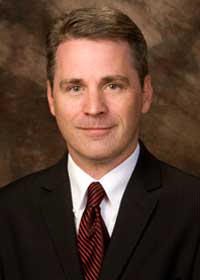A decade after the Sept. 11, 2001, terrorism attacks stunned the world, government measures and the watchful eyes of U.S. citizens have effectively made Americans safer from terrorists, NIU political science professor Christopher Jones says.
Government agencies have been talking to each other more, airport security is tougher and citizens themselves are more alert.
“People have adapted to the times,” says Jones, an expert in national security. “In 10 years, we have taken all kinds of measures. The FBI is working with the CIA, and people are becoming more vigilant. They are watching more. Just look at what happened with the failed car bombing in Times Square.”
Cameras that were installed over New York City streets recorded a car being awkwardly parked May 1, 2010, in busy Times Square. After the driver ran from it, a nearby vendor saw smoke streaming from the car and called police.
Officers evacuated the streets as it was detonating, but malfunctioning. The cameras photographed the driver and police arrested him two days later.
“It’s a good thing we are becoming more aware of the risks,” Jones says. “We, or the police, must be right 100 percent of the time, but a terrorist has to be right only once.”
Still, more work must be done to ensure every thread of America’s fabric is safe, including closely tracking foreign visitors and visas, Jones says.
Another area of continued concern is cyber-terrorism, says Raimund Ege, an associate professor in NIU’s computer science department who is an expert in information security.
The United States is dependent on computers to bank, pay bills, distribute electricity, communicate and protect its borders from military attacks.
“We as consumers of information technology need to do our share to protect ourselves and others. It can be as simple as routinely changing our passwords to protect our identities,” Ege says. “We all need to increase our awareness in light of the constant risks of attacks to the global network.”
The federal Homeland Security Act, enacted in 2002, has prepared the United States to better protect its infrastructure.
The act contains the Cybersecurity Compliance Division that enforces such provisions as the Cybersecurity Education Enhancement Act, the Cybersecurity Safety Standards Act and the Cybersecurity Public Awareness Act.
These and other provisions impose regulations on computer use and information exchange on a myriad of federal, state and local agencies.
“We are safer (from cyber terrorism),” Ege says. “But cyber warfare has been added to the arsenal of people and countries who want to harm others.”
Continued public and governmental vigilance on all fronts will diminish the effectiveness of cyber terrorism attacks and reduce the arsenal, he adds.
by Gerard Dziuba


